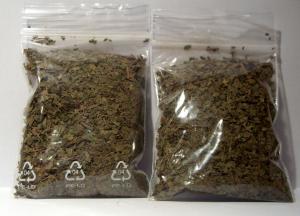Democrats are fighting over whether to enact incremental marijuana reforms, or to block them until legalization with social justice can pass.
Faced with an International Criminal Court investigation, the Duterte administration in the Philippines has argued that it is investigating its own drug war killing campaign and so the ICC shouldn't. The famous human rights attorney Chel Diokno will reply as part of our NGO side event next week, on the online margins of the annual Assembly of States Parties to the Rome Treaty.
Minnesota patients will soon be enjoying edibles, a Rhode Island lawsuit aimed at protecting patients from employment discrimination gets settled, and more.
A rogue cop in northern California goes down for stealing weed and cash from motorists in the guise of marijuana law enforcement, and more.
Evo Morales marches back into Bolivia's capitol alongside the current president, the Vermont Medical Society wants to limit THC in marijuana available in the state, and more.
Georgia's parliament toughens that country's drug laws, the Rhode Island ACLU announces a settlement in a medical marijuana employment discrimination case, and more.
A new bipartisan federal bill aims to help states and localities with marijuana expungement efforts, New York state adjusts its COVID quarantine policies for drug treatment facilities, and more.
Republican lawmakers in Missouri and Ohio roll out marijuana legalization legislation, the New York Times reports that the Syrian government is a major trafficker of the amphetamine captagon, and more.
Language protecting banks doing business with state-legal marijuana firms has been removed from a defense spending bill, Canada's Alberta province is looking into establishing a safe drug supply, and more.
The Canadian federal government has again filed a bill to end mandatory minimums for drug offenses, WHO declines to recommend a "critical review" of kratom, and more.
In the ongoing struggle among congressional Democrats over whether to prioritize incremental marijuana reform legislation over pushing for full federal legalization, proponents of the former saw a stinging defeat this week when Senate heavyweights stripped the SAFE Banking Act (HR 1996) out of the Senate version of the must-pass National Defense Authorization Act (NDAA).

Democrats and even reformers are divided on how to advance marijuana reforms on Capitol Hill. (Creative Commons)
The SAFE Banking Act would protect financial institutions that do business with state-legal marijuana companies even while federal marijuana prohibition remains intact. Its backers argue that it is desperately needed to protect the industry from the logistical and security burdens of conducting a billion-dollar all-cash business. They managed to get the act's language inserted into the NDAA when the measure passed the House in September.
But Senate Majority Leader Chuck Schumer (D-NY), Senate Finance Committee Chair Sen. Ron Wyden (D-OR), and Sen. Cory Booker, who have drafted their own full legalization bill, had made it clear for weeks that they wanted to hold off on the banking bill until after Congress passes legalization. And they still felt that way this week despite pressure from other senators to keep the banking bill in the NDAA.
"We're going to keep talking, but Sen. Schumer, Sen. Booker, and I have agreed that we'll stay this course," Wyden told reporters Monday, adding that "the federal government has got to end this era of Reefer Madness."
The move infuriated SAFE Banking Act supporters. Rep. Ed Perlmutter (D-CO), chief sponsor of the bill, moved to reinsert the bill language in a meeting of the House Rules Committee Wednesday, but ultimately decided not to force a vote on the amendment. And Rules Committee Chairman Jim McGovern lashed out at Schumer during the debate.
"I don't really quite know what the hell his problem is,"McGovern said, referring to Schumer. "But what he's doing is he's making it very difficult for a lot of small businesses -- and minority-owned businesses, too -- [who] deal with the issue of cannabis to be able to move forward and to expand and to hire more people."
The issue has also split the drug reform community, with groups such as the Marijuana Policy Project (MPP) and the National Organization for the Reform of Marijuana Laws (NORML) supporting the push for the SAFE Banking Act while others such as Drug Policy Alliance (DPA) calling for outright legalization to be done at the same time as banking.
"Marijuana criminalization means nearly every minute someone is arrested for marijuana and it serves as the pretext for horrific interactions with law enforcement, like the death of Philando Castile," DPA executive director Kassandra Frederique said in a press release. "While we agree cannabis businesses, like any other businesses, need access to banking services -- and in fact, the DPA-supported MORE Act (HR 3617) would fully resolve the marijuana banking issue -- we cannot do so at the expense of equity and justice for Black, Latinx and Indigenous communities that have borne the brunt of prohibition. And we cannot prioritize banking services while cannabis continues to be used as justification for police violence against these communities," she added.
"By slipping SAFE into the Defense Authorization bill ahead of moving the MORE Act, Congress is sending a clear message that the industry and huge multi-state operators take precedent before the countless people that have had their lives devastated by punitive and racially-motivated drug policies," Frederique continued. "We can and must move comprehensive marijuana reform -- centered in equity, justice and community reinvestment -- first and foremost. Then, and only then, can we talk about banking inconvenience."
"We are disappointed in the elimination of the SAFE Banking provisions from the NDAA," MPP deputy director said in a Tuesday statement. "It is unacceptable that so many state-licensed cannabis businesses are operating entirely in cash simply because the Biden administration and Congress, in spite of overwhelming public support, refuse to support even modest reforms to our country's failed federal cannabis laws."
While acknowledging that the banking bill did not take on the social justice side of the equation, Schweich argued it would have been at least some progress.
"While the SAFE Banking provisions would not have addressed criminal justice reform, this was a valuable opportunity for incremental progress, a principle that has served the cannabis reform movement well for many years," he said. "Furthermore, Congress has missed an opportunity to assist hundreds of small and minority-owned businesses in medical and adult-use cannabis states across the country. Without SAFE Banking, employees of cannabis businesses will continue to face public safety risks. Cannabis businesses are experiencing burglaries, armed robberies, and thefts at disturbing rates. It is abundantly clear that leaving cannabis businesses unbanked is dangerous for both workers and the surrounding community."
NORML was equally perturbed.
"It is unfortunate that Congress failed to take this opportunity to affirm the legitimacy of state-legal marijuana markets and instead acted in a way that will continue to deny this emerging legal industry access to basic financial tools and services," NORML political director Justin Strekal said in a Tuesday statement. "Until Congressional action is taken, state-licensed marijuana businesses and those millions of Americans that patronize them will continue to be at a higher risk of robbery due to the all-cash nature of this industry. Furthermore, smaller entrepreneurs who seek to enter this industry will continue to struggle to compete against larger, more well-established and well-capitalized interests."
Despite the defeat this week, the fight to get the SAFE Banking Act back in the NDAA is not over. The current version of the NDAA will now have to go back to both chambers for final approval before heading to the president's desk, and the act's supporters will certainly try to get it reinserted before then.
Meanwhile, the prospects for actual ending federal marijuana prohibition this year appear dim, especially given that it would need 60 votes in the Senate, where Republicans have operated primarily as obstructionists so far. If neither the SAFE Banking Act nor marijuana legalization materializes, the Democrats will have squandered an opportunity to pass important, popular legislation. There's still next year, but it is already looking to be pretty messy in the run-up to the mid-term elections.
back to top
Keeping It Real: Duterte's Drug War Slaughter and the ICC
side event on the online margins of the Assembly of States Parties to the Rome Treaty (ICC)
Wednesday 15 December 2021, 7:00am New York / 1:00pm The Hague / 8:00pm Manila
Zoom registration: https://us02web.zoom.us/meeting/register/tZYrdeqoqTMiGda-kkne8zE-zA9LxojrGwz9
Facebook Live: https://www.facebook.com/77796516946/videos/1743934149133434
YouTube livestream: https://youtu.be/VCwxNrBDwXk
Since taking office in 2016, President Rodrigo Duterte of the Philippines has presided over a drug war extrajudicial killing campaign in which NGOs estimate more than 30,000 people have died. In response to the threat and now reality of an investigation by the International Criminal Court, the Duterte administration has argued the ICC lacks jurisdiction because the Philippines has an accountability process underway. But the scope of the government's investigations, and of any results from them, both remain very small.
"Keeping It Real" will discuss the Philippine Department of Justice's Interagency Task Force, the continuing reality of government orchestrated extrajudicial killings, the administration's recent motion to suspend the ICC investigation, and the incarceration of Duterte critic Senator Leila de Lima as it approaches its five-year mark and as she runs for reelection from jail.

human rights attorney Chel Diokno
is Founding Dean of the De La Salle University (DLSU) College of Law, where he served as Dean from 2010-2019; and is Chair of the Free Legal Assistance Group (FLAG), the oldest organization of human rights lawyers in the Philippines. Already prominent in legal circles, Diokno gained greater fame while running for Senate in 2019, especially among Filipino youth, and he is a 1Sambayan coalition candidate for Senate in 2022.
Comments on ICC process by Elizabeth Evenson, Associate Director, International Justice Program, Human Rights Watch
Other commenters to be announced.
co-moderators:
David Borden, Executive Director, StoptheDrugWar.org
Marco Perduca, former Senator, Italy, 2008-2013
Organized by DRCNet Foundation AKA StoptheDrugWar.org, cosponsored by Associazone Luca Coscioni, Ecumenical Advocacy Network for the Philippines, Filipino American Human Rights Alliance, Forum Droghe, other cosponsors TBA.
Register here. Visit https://stopthedrugwar.org/philippines to read about our work in this area.
back to top
Minnesota patients will soon be enjoying edibles, a Rhode Island lawsuit aimed at protecting patients from employment discrimination gets settled, and more.
FloridaFlorida Bill to Protect Patient Privacy Filed. A bill to protect patient privacy by blocking the scheduled repeal of an exemption for medical marijuana from some public records requirements was filed Thursday. HB 7005 was filed by the House Government Operations Subcommittee. A companion bill is pending in the Senate.
Minnesota
Minnesota Medical Marijuana Program to Add Edibles as New Option. The state Health Department announced Wednesday that its medical marijuana program is adding edibles as a new option for patients. The department said it is adding infused edibles in gummies and chews as approved delivery methods for marijuana. Other approved delivery methods are pills, vapor oil, liquids, topicals, powdered mixtures, and orally dissolvable products, like lozenges, but not smokeable flowers. Smokeable flowers will be allowed in March 2022, based on a law approved by the legislature this year.
Rhode Island
Rhode Island ACLU Announces Settlement of Lawsuit Protecting Medical Marijuana Patients from Discrimination.The ACLU of Rhode Island on Thursday announced the settlement of a lawsuit dealing with the rights of medical marijuana patients in employment. The settlement comes four years after Rhode Island Superior Court Justice Richard Licht ruled in the case that a Westerly fabrics company discriminated against Christine Callaghan when consideration of a paid internship was rescinded because of her participation in the state's medical marijuana program and her acknowledgment that she therefore would not be able to pass a required pre-employment drug screen.
In its decision, the court held that the state's medical marijuana law, which bars discrimination in employment against cardholders, applies to job applicants like Callaghan. Under the settlement agreement, the company has agreed to pay Callaghan $3,500 in back pay and compensatory damages, and to pay attorneys' fees. The company has also agreed to amend its drug use policy to consider applicants who are authorized medical marijuana cardholders.
back to top
A rogue cop in northern California goes down for stealing weed and cash from motorists in the guise of marijuana law enforcement, and more. Let's get to it:
In Chicago,
a former Cook County sheriff's deputy was arrested last Thursday for his alleged role in trafficking cocaine from Mexico to Illinois. Juan Carmona, 46, went down after Homeland Security Investigations discovered Carmona's participation in an international cocaine trafficking ring and seized 16 kilograms of cocaine from two residences he owned. He is charged with calculated criminal drug conspiracy, criminal drug conspiracy, controlled substance trafficking, possession of a controlled substance with intent to deliver and possession of a controlled substance. He's looking at a mandatory minimum 30-year sentence on the conspiracy charges.
In San Francisco, a former Rohnert Park drug interdiction team leader pleaded guilty last Wednesday to conspiring with a team member to steal cash and marijuana from motorists traveling local highways. Ex-Sgt. Brandan "Jacy" Tatum and his partner, Joseph Huffaker, were both indicted in 2018; Tatum is the one who pleaded guilty last week. The pair ranged well beyond the Rohnert Park city limits to stop motorists in Sonoma and Marin counties and unlawfully seize their property under the guise of marijuana law enforcement. The pair went down after a string of motorists complained about them to local media. Tatum pleaded guiltyto federal charges of conspiracy to commit extortion under "color of law," falsifying records in a federal investigation and tax evasion. Tatum is set to be sentenced on March 9.
back to top
Evo Morales marches back into Bolivia's capitol alongside the current president, the Vermont Medical Society wants to limit THC in marijuana available in the state, and more.
Marijuana PolicyVermont Medical Society Urges Ban on Sale on Marijuana with More Than 15% THC. The Vermont Medical Society is urging state officials to ban the sale of marijuana containing more than 15 percent tetrahydrocannabinol, or THC, the main psychoactive compound in marijuana. The group's board adopted a resolution asking the legislature and the state Cannabis Control Board to adopt the ban. The physicians said high-potency marijuana was associated with more emergency room visits for respiratory distress and "serious medical outcomes," although it is not clear what those "serious medical outcomes" are. The association is also urging that all marijuana products be labelled with warnings that it "may cause psychosis, impaired driving, addiction, and harm to fetuses and nursing babies."
Drug Policy
Austin Municipal Initiative to Decriminalize Pot Possession, Bar No-Knock Raids Has Enough Signatures to Make Ballot. An Austin progressive nonprofit, Ground Game Texas, has announced that it has gathered enough signatures for the Austin Freedom Act of 2021 to qualify for the ballot. The initiative would decriminalize the possession of small amounts of marijuana and bar the use of no-knock search warrants. The group needs 20,000 valid voter signatures to qualify and says it has gathered 30,000 raw signatures.
International
Bolivian President and Predecessor Evo Morales Lead March of Thousands into La Paz. President Alberto Arce and his ousted predecessor, Evo Morales, led a march of thousands of coca farmers, miners, and local residents into the capital Monday after marching across the country for a week. The rally was called by the ruling Movement Toward Socialism to demonstrate support for the government against "right wing" elements. Morales had been ousted in 2019 after contested elections and replaced by rightist lawmaker Jeanine Anez. Anez herself now faces sedition, terrorism, and conspiracy charges for her actions during her brief reign, and Morales has now regained leadership of the largest coca growers' union in the country.
Sri Lanka Moves to Legalize Hemp Exports. The government is preparing to introduce a bill to legalize the export of hemp, said State Minister of Indigenous Medicine Promotion, Rural and Ayurvedic Hospitals Development, and Community Health Sisira Jayakody. "There has been clinical evidence of the benefits of this plant. We must remember that cancer and other major diseases have also been treated with Hemp. Because of this, within the next three months we plan on presenting a bill to Parliament for the legalization of the export of hemp for medicinal use ," said Jayakody.
back to top
Georgia's parliament toughens that country's drug laws, the Rhode Island ACLU announces a settlement in a medical marijuana employment discrimination case, and more.

The DEA has set a whopping increase in research quotas for psilocybin, among other psychedelics. (Creative Commons)
Minnesota Medical Marijuana Program to Add Edibles as New Option. The state Health Department announced Wednesday that its medical marijuana program is adding edibles as a new option for patients. The department said it is adding infused edibles in gummies and chews as approved delivery methods for marijuana. Other approved delivery methods are pills, vapor oil, liquids, topicals, powdered mixtures, and orally dissolvable products, like lozenges, but not smokeable flowers. Smokeable flowers will be allowed in March 2022, based on a law approved by the legislature this year.
Rhode Island ACLU Announces Settlement of Lawsuit Protecting Medical Marijuana Patients from Discrimination.The ACLU of Rhode Island on Thursday announced the settlement of a lawsuit dealing with the rights of medical marijuana patients in employment. The settlement comes four years after Rhode Island Superior Court Justice Richard Licht ruled in the case that a Westerly fabrics company discriminated against Christine Callaghan when consideration of a paid internship was rescinded because of her participation in the state's medical marijuana program and her acknowledgment that she therefore would not be able to pass a required pre-employment drug screen. In its decision, the court held that the state's medical marijuana law, which bars discrimination in employment against cardholders, applies to job applicants like Callaghan. Under the settlement agreement, the company has agreed to pay Callaghan $3,500 in back pay and compensatory damages, and to pay attorneys' fees. The company has also agreed to amend its drug use policy to consider applicants who are authorized medical marijuana cardholders.
Psychedelics
DEA Again Boosts 2022 Production Goals for Psychedelics Such as Psilocybin, MDMA, and DMT. In a notice in the Federal Register Thursday, the DEA has again increased the quota for the production for research purposes of illegal controlled substances such as psilocybin, MDMA, and DMT. The agency has repeatedly raised the quotas beginning with 2021 quotas in response to increasing scientific interest in psychedelics. In some cases, the increases are quite dramatic. With psilocybin, for instance, the DEA first set a 2021 quota of 30 grams. That quota is now set at 8,000 grams for next year -- a 26,567 percent increase.
International
Georgia Parliament Toughens Penalties for Illegal Drug Dealing. Parliament has adopted amendments to the criminal code, voting 84-1 to increase penalties for drug dealing. Sales of narcotic drugs will see penalties increase from a mandatory minimum of six years to 10 years, with the maximum penalty increasing from 11 years to 15 years. There a higher penalties for large quantities of narcotics. The penalty for selling psychotropic drugs (marijuana psychedelics) increases to a three-year mandatory minimum from what was a three-year maximum sentence. Again, there are more severe penalties for sales of larger quantities.
back to top
A new bipartisan federal bill aims to help states and localities with marijuana expungement efforts, New York state adjusts its COVID quarantine policies for drug treatment facilities, and more.

Fentanyl and its analogs are the subject of a battle over draconian emergency scheduling. (Creative Commons)
Bipartisan Federal Bill to Incentive State-Level Expungements Filed. Reps. Dave Joyce (R-OH) and Alexandria Ocasio-Cortez (D-NY) filed a bill Thursday that would provide incentives for state and local governments to expunge marijuana arrest and conviction records in their jurisdictions. The bill is the Harnessing Opportunities by Pursuing Expungement (HOPE) Act. It would create a State Expungement Opportunity Grant Program that would help fund administrative costs in identifying clearing eligible cases at the rate of $2 million a year through 2032.
Medical Marijuana
Florida Bill to Protect Patient Privacy Filed. A bill to protect patient privacy by blocking the scheduled repeal of an exemption from public records requirements for certain information held by the state Department of Health relating to patients, caregivers, & qualified physicians for medical use of marijuana was filed Thursday. HB 7005 was filed by the House Government Operations Subcommittee. A companion bill is pending in the Senate.
Drug Treatment
New York to Alter Covid-Related Policy That Hindered the Work of Drug Treatment Facilities. For months, the state's Office of Addiction Services and Support (OASAS) has had a policy requiring drug treatment admitting new patients for long-term care for 14 days after a COVID case was discovered on the property. Drug treatment providers say the rule has hindered their work, and OASAS has now responded to their complaints. Now, it is altering the policy to review COVID positives in those facilities on a "case by case" basis. "At the height of the COVID-19 pandemic this policy was issued consistent with CDC and DOH guidance. It is specific to OASAS congregate settings since the population we serve is high-risk because of high rates of co-morbidities, lower vaccination rates, and high turnover rates in these facilities. People with an SUD diagnosis are at higher risk for COVID-19 complications, including hospitalization and death. We have since updated our policy to make these decisions on a case by case basis," OASAS said.
Sentencing
Groups Say Congress Should Reject Biden's Harmful Sentencing Proposal on Fentanyl-Related Drugs. A coalition of civil rights and drug reform advocacy groups called Thursday for Congress to reject the Biden administration's proposal to permanently reclassify fentanyl-related substances as Schedule I drugs, calling the approach toward the synthetic opioids a dangerous continuation of the so-called war on drugs that will do little to quell what is a public health issue. The Biden proposal would a Trump-era policy would continue by permanently placing fentanyl-related substances, or fentanyl analogues, into Schedule I -- a designation that currently covers substances including ecstasy and heroin, is aimed at drugs with "no currently accepted medical use and a high potential for abuse," and can lead to stiffer penalties. "Congress must chart a new course to save lives," said Maritza Perez, director of the Office of National Affairs at the Drug Policy Alliance, in a statement noting the record number of drug overdose deaths, which have been driven in part by fentanyl. "The only way forward," she said, "is moving health-centered legislation that can provide lifesaving harm reduction services and evidence-based treatment for people who use drugs. Anything less is not a solution -- it's a cop-out for Congress."
back to top
Republican lawmakers in Missouri and Ohio roll out marijuana legalization legislation, the New York Times reports that the Syrian government is a major trafficker of the amphetamine captagon, and more.

Captagon being cooked by ISIS. Now, the Syrian government is in the same business. (Creative Commons)
Missouri GOP Lawmaker Files Joint Resolution to Put Marijuana Legalization on the Ballot. State Rep. Shamed Dogan (R) has pre-filed a joint resolution to put a marijuana legalization constitutional amendment on the November 2022 ballot. Under Dogan's plan, adults could grow, purchase, and possess marijuana for personal use, although no amounts are specified. The resolution also calls for a 12 percent tax on recreational marijuana and a four percent tax on medical. The resolution comes as activists pursue at least two separate marijuana legalization initiatives, with one campaign beginning signature-gathering last week.
Ohio Republican Lawmakers File Marijuana Legalization Bill. Two Republican state representatives, Jamie Callender and Ron Ferguson, have filed a marijuana legalization bill. Their "Ohio Adult Use Act" would legalize the possession of up to 50 grams of pot and the cultivation of up to six plants, only three of which could be mature. The bill also allows for the unremunerated gifting of up to 25 grams of marijuana and envisions a 10 percent tax, with proceeds going to the state general fund (50 percent), combatting drug trafficking (25 percent), and drug treatment programs (25 percent). The bill comes as activists are nearing signature-gathering goals for the first phase of an effort to get the issue directly before the voters.
International
Costa Rica Supreme Court Has No Problems with Draft Medical Marijuana and Hemp Bill. Ruling on a charge by a group of deputies that the proposed draft Law on Cannabis for Medicinal and Therapeutic Use and Hemp for Food and Industrial Use was somehow unconstitutional, the constitutional chamber of the Supreme Court of Justice has ruled that it is not. That clears the way for the measure to continue advancing in the Legislative Assembly, and the Executive Power is ready to do so: "Given the resolution issued this Tuesday by the Constitutional Chamber, in which it indicates that there are no unconstitutionalities in the bill on Cannabis for Medicinal and Therapeutic Use and Hemp for Food and Industrial use (file 21,388), the Executive Branch presents immediately the call for this initiative in the period of extraordinary sessions, so that once the full sentence arrives, it will proceed with its process," said Geannina Dinarte Romero, Minister of the Presidency.
Syrian Government Implicated in Major Drug Trafficking. The New York Times reports that close associates of President Bashar al-Assad are manufacturing and distributing massive quantities of the amphetamine-type stimulant captagon, creating what the Times called "a new narcostate on the Mediterranean." The country's illegal drug industry includes factories that make the pills, packing plants where they are packaged for export, and smuggling networks that extend throughout the Middle East and South Asia. "Much of the production and distribution is overseen by the Fourth Armored Division of the Syrian Army, an elite unit commanded by Maher al-Assad, the president's younger brother and one of Syria's most powerful men," the newspaper reported. It also named other members of the president's extended family, businessmen, and the Lebanese militant group Hezbollah. With the country's legal economy decimated by a decade of civil war, the illicit drug trade has become a major revenue source for the regime.
United Kingdom Plan to Target Drug Crime Could See Users of Class A Drugs Lose Passports. Prime Minister is set to launch a 10-year plan to tackle drug-related crime this week, and early reports said some measures will be aimed at middle class drug users to act as a "deterrent for well-off professionals who peddle coke at swanky clubs and dinner parties," according to the tabloid The Sun. "We need to look at new ways of penalizing them. Things that will actually interfere with their lives," the prime minister told the paper. "So we will look at taking away their passports and driving licenses. What I want to see is a world in which we have penalties for lifestyle drug users that will seriously interfere with their enjoyment of their own lifestyles." Meanwhile, amid reports of widespread cocaine use at Parliament, there are reports drug-sniffing dogs could be deployed across the premises as part of a crackdown by House of Commons authorities.
back to top
Language protecting banks doing business with state-legal marijuana firms has been removed from a defense spending bill, Canada's Alberta province is looking into establishing a safe drug supply, and more.
Marijuana PolicyMarijuana Banking Language Now Not Included in Defense Bill. The House included language to protect financial institutions that deal with state-legal marijuana businesses in its version of the National Defense Authorization Act (NDAA), which it passed in September, but now, after negotiations between the House and Senate, that provision has been stripped out. There is still, however, a chance it good be added back in before final votes in both chambers are taken. The House Rules Committee is meeting Tuesday, and Safe Banking Act sponsor Rep. Ed Perlmutter (D-CO), who is a member of the committee, said he will file an amendment to restore banking language to the bill.
Drug Policy
DEA, NIDA Back White House Black to Ease Research Barriers on Marijuana, Psychedelics, and Other Schedule I Drugs. The Office of National Drug Control Policy (ONDCP -- the drug czar's office) has proposed a plan to ease barriers to research for Schedule I drugs, and now both the DEA and the National Institute on Drug Abuse (NIDA) have said they are on board with the plan. In written testimony before a House Energy and Commerce subcommittee last Thursday, DEA said that "expanding access to Schedule I research is a critical part of DEA's mission to protect public safety and health. DEA supports the administration's legislative proposal's expansion of access to Schedule I research. DEA looks forward to continuing to work with the research community and our interagency partners to facilitate Schedule I research." NIDA Director Nora Volkow echoed the DEA support, saying existing procedures are "time consuming" and "cumbersome."
International
Canada's Alberta to Study Safe Drug Supply. The prairie province's United Conservative government has proposed that a committee of Members of the Legislative Assembly (MLAs) look into the pluses and minuses of offering pharmaceutical versions of opioids and other addictive substances to people dependent on them. "I want to look at objective evidence so both for and against," said Mike Ellis, associate minister of mental health and addictions. "I want evidence to be presented at this committee, and I look forward to seeing their findings." The committee will be required to submit a report with recommendations by the end of April. Both the province of British Columbia and the city of Toronto are already moving forward with efforts to win a federal exemption to allow for the distribution of controlled substances in a bid to reduce drug overdoses from an unsecured supply.
Colombia Party Scene Has Pill Testing. A group that originated seven years ago with university students demanding pill and powder testing at parties is now actually doing drug purity testing at clubs and festivals -- without government support but also without government interference. The group, Echele Cabeza, is now doing about 250 tests a month. The costs are covered by event organizers, with additional funding from an NGO that helps drug users. New Zealand recently became the first country in the world to formally legalize pill testing.
Mexico Supreme Court Throws Out Law Making Growing Low THC Marijuana Illegal. Even as the Mexican congress stumbles toward Supreme Court-mandated marijuana legalization, the Supreme Court has now thrown out a law that made growing low-THC marijuana illegal. The law barred the cultivation of marijuana with less than 1 percent THC, but the court held that law unconstitutional. The national health agency, COFEPRIS, had interpreted the law to bar all marijuana cultivation except for medical and scientific purposes, but now companies will be able to cultivate the crop to produced low-THC CBD products such as tinctures, oils, and beverages.
back to top
The Canadian federal government has again filed a bill to end mandatory minimums for drug offenses, WHO declines to recommend a "critical review" of kratom, and more.

kratom (Creative Commons)
WHO Declines to Recommend "Critical Review" of Kratom. The World Health Organization's (WHO) Expert Committee on Drug Dependence (ECDD) has recommended that kratom not be subjected to a "critical review," which could have been a first step toward labeling it a controlled substance subject to international and national controls. The ECDD did a "pre-review" of kratom at its October meeting and found there was inadequate evidence to recommend a critical review. WHO had begun the "pre-review" based in part on a "country-level report indicating the potential for abuse, dependence and harm to public health from" the chemical compounds in kratom. But it found concerns about fatalities associated with kratom to be overstated: "Kratom can produce serious toxicity in people who use high doses, but the number of cases is probably low as a proportion of the total number of people who use kratom," WHO stated in the document. "Although mitragynine has been analytically confirmed in a number of deaths, almost all involve use of other substances, so the degree to which kratom use has been a contributory factor to fatalities is unclear."
Drug Treatment
US Government Will Test Ibogaine Derivative as An Addiction Treatment. A private startup will work with the National Institute on Drug Abuse (NIDA) to test its patented version of ibogaine as a potential treatment for drug addiction. "The therapeutic potential for ibogaine is huge," says David Olson, cofounder of the company, Delix. "There are some indications that a single dose can keep people with opioid use disorder drug-free for months." Derived from the iboga shrub in West Africa, ibogaine is a powerful psychedelic that has been found to help people get off heroin and other opioids, but the Delix version is non-psychedelic and does not cause cardiac arrhythmias.
"We started with the ibogaine structure because of its fantastic efficacy, and we whittled it down to its essential feature," says Olson, describing how he modified ibogaine to remove the psychedelic-inducing properties. "By cutting it down, we got rid of these undesired side effects." NIDA's Addiction Treatment Discovery Program is set to contract a lab to do preclinical tests on the Delix compouond. If the preclinical data finds the drug could be a safe and effective potential addiction treatment, the company will apply to the Food & Drug Administration to launch human clinical trials.
Harm Reduction
Washington Post Editorial Board Endorses Safe Injection Sites. Under the headline "Tough-on-drugs policies have failed. Supervised injection sites will save lives," the Washington Post editorial board has come down firmly in favor of the harm reduction intervention. Noting that New York City has just become the first in the US to officially allow safe injection sites, the Post notes that "this strategy may seem counterintuitive as US drug overdose deaths reach unprecedented levels. In fact, a smart and compassionate approach, which other countries have already tested, will save lives where tough-on-drug policies have failed."
After examining New York City's approach and noting questions about the legality of allowing supervised drug use, the Post editorial concludes thusly: "There is no magic bullet to combat drug addiction, but one thing is clear: A trained person on-site to respond to someone in the throes of an overdose can save that life. More US cities should embrace the opportunity to prevent needless death; the Biden administration should stay out of the way; and Congress should change federal law to clarify that local governments can authorize this lifesaving work. No more people should have to die before attitudes finally change."
International
Canada's Liberal Government Files Bill to Repeal Mandatory Minimum Sentences for Drug Offenses. The federal government filed a bill in the House of Commons Tuesday that would end mandatory minimum sentences for drug offenses, as well as some gun-related offenses. The bill would return sentencing discretion to judges and would also allow for the greater use of probationary sentences, as well as house arrest, counseling, or drug treatment. The bill revives legislation that was introduced in February but was not approved before Prime Minister Justin Trudeau called a federal election in August. Mandatory minimum sentences "simply did not work," Justice Minister David Lametti said as the bill was rolled out.
back to top








